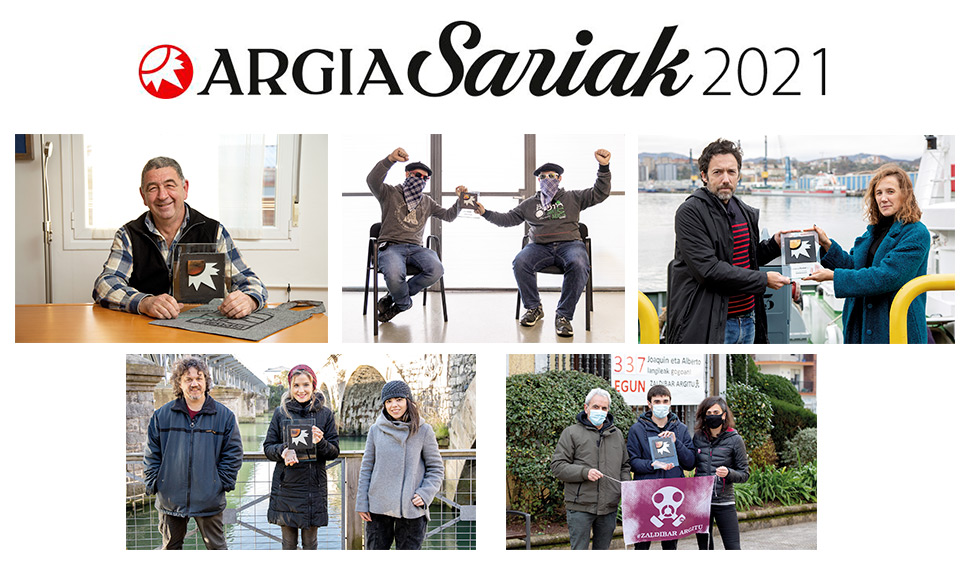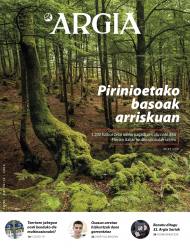In the world there are smells and aromas.
- The garbage jump plummeted. A landfill that has devoured everything until the last day, to the point of swallowing two workers. A year has passed and there is still a rotting smell at Zaldibar. A crime located in a grey port does not have a better breath. Mafia hedges. What about a rotten, bloodless murder? The pink smells bad, from north to south. But it's not all rotten, and there are exquisite perfumes that make a bridge to bring those of us away from the border. The Basque himself, how beautiful it is, and the work that is done to spread it to the fullest also has a sweet aroma.

Awards to all those who remind us that it smells rotten, that bring us to the screen a raw story that has a lot of reality playing with corruption and that allow us to smell the perfume above the breath that circulates around.
AUDIOVISUAL. “SANDBOX”
It has marked a turning point in the history of the series in Basque. The first music captures it on the net through music and images. The port, the fishermen, the ice, the drug, the penetrating smell of mafia -- who is who and what he's going to do in a panorama that you can't guess. A missing, detective of the Ertzaintza who performs the therapy of the psychologist, a young and mysterious local police, small and large trapicgrowers. What happened in eleven ports of the West, now by fiction, but also very close to reality.
They had components for a good thriller and they invented it, giving it their own touch with the “Color Almandoz”. This is explained by the author: “It is a success for me to have done what we have done under the conditions we have had. The technical and artistic team has done a great job for a year. We always try to give it our touch and do something special. With the conditions we had we could not compete with the thriller made in the world (we had no means to do persecutions, we did not have specialists to pull through the bridge...). So, it's what you think: at least, let's count in our own way what we want to count. It makes no sense to copy another and, in addition, with less means.”
Reference has been made to television series linked to the black novel, both American and Scandinavian. Also the Basque “interesting and malignant contemporary” black novel.
“The sociological identity of Ondarroa is very special, also aesthetically we were attracted to this project,” says the producer Marian Fernández, who is satisfied with the reception he has had. Without forgetting to claim dignity for Basque creators.
CAMPAIGN. ILLUMINATE ZALDIBAR
With
five words, they have demonstrated the ability to question the world today and to sum up a political agenda capable of protecting thousands of people: Staff, health, responsibilities. Zaldibar Argitu
This movement, created from the bottom by the citizens, has served as an ant for a year to prevent Joaquín Beltrán and Alberto Sololuze from falling into oblivion. “This issue has erupted here, but it affects many areas. These customer networks are not alone at Zaldibar”, “it’s been a warning of which model of society we are driving, which business model and what is hidden in the hole of this Basque oasis under the supposed wealth and for whom that damage is,” said fellow Janire Lazkano and Jokin Bergara.
“The pandemic has become the only media issue and has done us no favor. But one of the things that the crisis has brought is to question the management of strategic sectors and to bet on the public (health, education…). This has a link to the struggles that have occurred during the pandemic: putting lives at the centre, care, etc. and with our struggle,” stressed Gaizka Zabarte.
Work will continue in 2021 both in the courts and in Europe.
Always working in the field of communication with a great deal, be it singing, be it the symbol, be it reading, or the model of mobilization... they have managed to add amplitude without giving up their ideas.
RADIO. Bridges
We have been able to listen to the programme for four years. Every week they've been building bridges. They have crossed Euskal Herria from one side to the other. 360 radio programmes and at least four guests each. They have given the opportunity to meet peoples, people, news and projects.
“We wanted to build bridges between the lands that actually want to be separated by a bridge. Within this Basque Country of seven territories, on many occasions, we have internal borders, built from the non-knowledge, prejudices, and the objective of the program was to be an open gaze program”, says Alaia Martin, director of the program, with whom during the first two years the Latvian Sulatina of Las Palmas worked, and so follows Pantxis Bidart: “Even though we don’t want there to be a border, it is there and this pandemic has taught us that they can emphasize that border that is open at a first glance. It is up to us to build bridges and relationships across those borders.”
Each program has been very hilarious, every week they have retained a word to the program and played with the word, with poetry. The ‘Azkena’ programme was launched in July 2020. He was the last to come. The presenters have invited us to follow the trail of the program and to continue building bridges. “That border also separates relations and limits reality, education, forms of communication; and to compensate for these deficiencies we believe that more collaboration is needed, more bridges, in the media and in many other areas,” they explained.
The Zubiak space will involve Alaia Martin and Pantxis Bidart, who will be responsible for the broadcast. Lohizune Amatria has collaborated from Navarra. It is a programme carried out jointly by Euskadi Irratia and France Bleu and in which Euskalerria Irratia has collaborated with them.
INTERNET. Encondings Vasco
Every language domain has to be visible in order to revitalize. Extended to all areas. And if in this 21st century there's an important field that directly influences the lives of all of us, that's the audiovisual world. But what can the Basques do in front of an army made up of NetFlix, Amazon, Filmin, the giants HBO or the thousands of Youtube and TV channels that speak only in Spanish?
To begin with, promote all the films, series, cartoons and audio-visual that emerge in Basque and make them available to the entire Basque community of the world. This is what the prize winner has been working on since 2003, in auzolan, disseminating audiovisual content in Basque in the community and in an open way in the network. What was at first a simple attempt to make the episodes of Dragoi Bola available to all audiences, 18 years later it has become the largest store of audiovisual material in Basque. About 1,500 films are displayed on the web, among many works of all kinds. Everyone in Euskera, “from the people to the people,” they say.
Forum leaders with over 7,000 users: “It doesn’t make much sense to say that it drives the recovery of an oppressed language and then copyright the contents in Basque.”
They claim the need for a commitment to policies to strengthen the Basque country: “We would like to see these government-funded projects for the promotion of the Basque Country. There's no interest. EiTB was created to promote the Basque country, but we see that the Spanish channel is the one that invests the most. Maybe ETB2 is also necessary, but if so, then more Euskera will have to be included in that chain.”
PRESS. JON ALONSO, “NAPARRA. OPEN CASE”
Much has been
written in the press about José Miguel Etxebarria Naparra, but not enough. By 2020, it is 40 years since its disappearance. Over the course of four decades there have been moments of all kinds in the Naparra case. Some media have often followed, the majority and the biggest have been difficult. As the winner of the Jon Alonso prize says, “the Naparra case is not only the case of a militant who was kidnapped and killed, but also of his family who has been tortured, beaten, swollen and punished without mercy.”
The writer reminds both the relatives of the missing and Naparra. Kid's playmate. He praises the “strength that the family has shown,” “they have never stopped looking for their family member.”
It's a research job. The case will remain open as long as there are no corpuscles and although this research work has not succeeded in locating the whereabouts of Naparra, it may perhaps be helpful for some step forward.
Memory is also work. Which puts the reader right in that 1980s. Naparra on the complicated issue. “The case is well known to my generation, but the book and documentary that will be published soon will help to put granite into the collective memory, to let future generations know what the case of Naparra is,” Alonso explained.
It's not a press job, but it's a written journalism, a research journalism. Worthy of reward.

The
restaurant Atxega Jauregia de Usurbil, with the aim
of maintaining the charm of the Aerita. The conversation that preceded the entrance. Hugs and kisses I had not seen for a long time. Family photo. A delicious meal. Review of what the year has done in video. Presentation of in-person prizes. Faces full of teeth, tongues, lips and nose as well as eyes. When we're missing, we value what we had. Argia Awards 2021. 32nd edition. This year I tried to feel everything on the screen, and although I was lacking in the excitement of the real Argia Awards, with the audio-visual and the interviews prepared for the event they have managed to get closer to the moment and awaken the curiosity for who will receive the next day’s prize.
They've had to invent a different format. Every day interviews have been held, videos have been recorded and a video has been made with the voices off and the words of the winners, from Monday to Friday. Five days, five awards.
They have sought the charm of the instant, to get the strength of what is in front of each other, to be touched by realism and improvised. They're not conversations that were recorded in a studio. They've looked after the stage and given every prize their own place. This year’s formula has served to make an interview that could not be done on the first side and has allowed the eleven threads remaining among the six words that release the prize in the Atxega Palace to be better stitched.
In all previous editions, once the award ceremony has been completed, a joint photo has been made of all those attending the trophie delivery; in the background, well visible, with the logos of all the sponsors of the Argia Awards that year.
This year either. There were no logos, but there were sponsorships. Provincial Council of Gipuzkoa, Provincial Council of Bizkaia, Government of Navarra, Department of Linguistic Policy of the Basque Government, Emakunde, Euskaltel, Laboral Kutxa, Kutxabank and the Mondragon Corporation.
And to all the people who don't have logos, but who give us the most faithful support, thank you.















